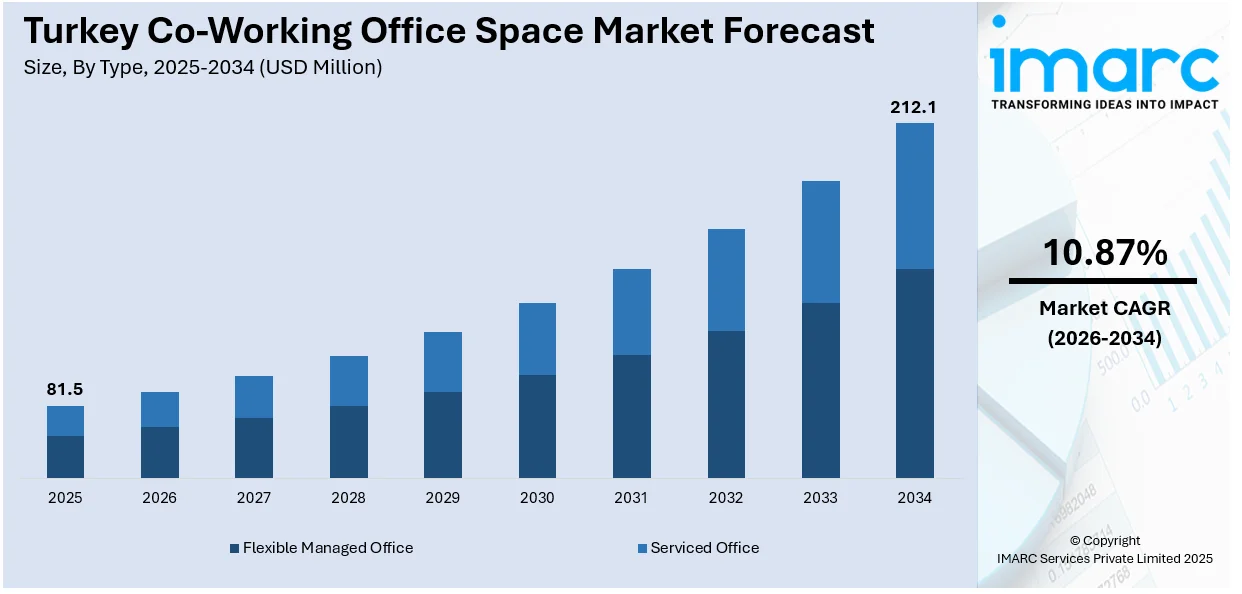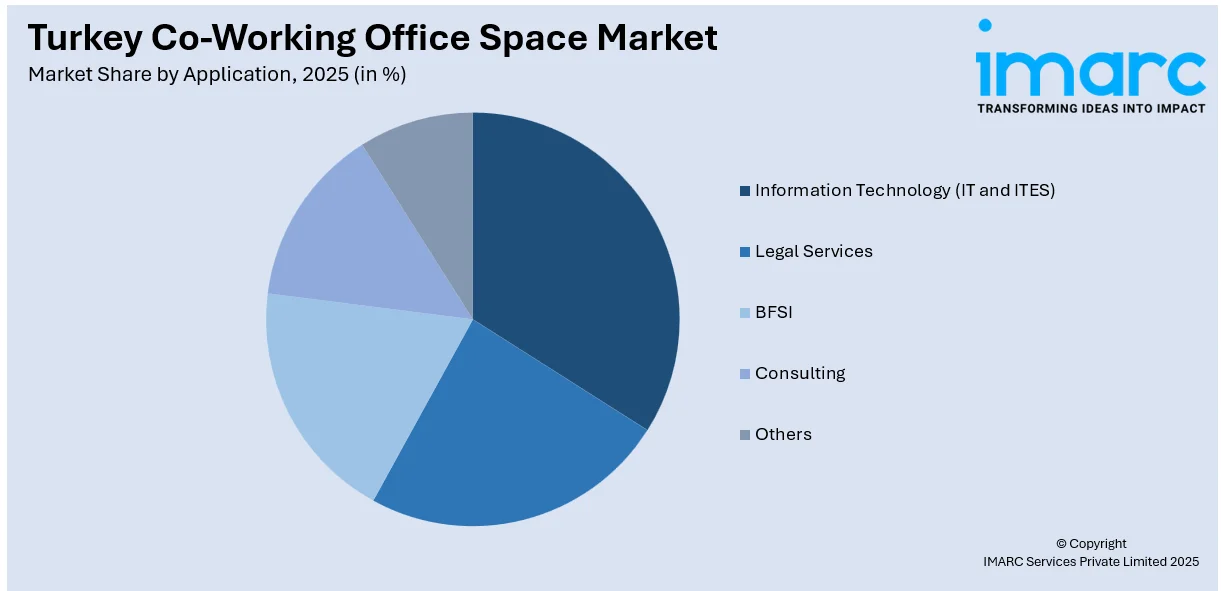
Turkey Co-Working Office Space Market Size, Share, Trends and Forecast by Type, Application, End User, and Region, 2026-2034
Turkey Co-Working Office Space Market Overview:
Turkey co-working office space market size reached USD 81.5 Million in 2025. Looking forward, IMARC Group expects the market to reach USD 212.1 Million by 2034, exhibiting a growth rate (CAGR) of 10.87% during 2026-2034.The market is experiencing positive growth as startups, freelancers, and enterprises seek flexible, collaborative work environments. Demand is concentrated in major cities such as Istanbul, Ankara, and Izmir, where modern infrastructure and hybrid work models are driving adoption. Providers are enhancing offerings with digital tools, networking events, and lifestyle amenities. These developments continue to transform work culture and influence the competitive Turkey co-working office space market share.
|
Report Attribute
|
Key Statistics
|
|---|---|
|
Base Year
|
2025
|
|
Forecast Years
|
2026-2034
|
|
Historical Years
|
2020-2025
|
| Market Size in 2025 | 81.5 Million |
| Market Forecast in 2034 | 212.1 Million |
| Market Growth Rate 2026-2034 | 11.80% |
Turkey Co-Working Office Space Market Trends:
Rise of Freelancers, Startups, and Digital Nomads
Turkey has seen a sharp increase in freelancers, entrepreneurs, and digital nomads, particularly in sectors like technology, design, and marketing. Such places are designed to support independent professionals by offering affordable spaces, chances to network, and a relaxing community with no long-term obligations. Due to their growing startups, cities such as Istanbul and Izmir now have a strong need for flexible workspaces that support people working together, new ideas, and expansion. Moreover, Turkey attracts international remote workers because it is economical, well-connected, and culturally appealing. Co-working hubs make sure to assist them by providing access all day long, speaking in their languages, and helping with visas. This demographic shift is reshaping the traditional office landscape and positioning co-working spaces as a key enabler of Turkey’s modern work culture.

To get more information on this market Request Sample
Technological Integration and Evolving Work Preferences
Technology is a core driver in the transformation of Turkey’s office landscape. Co-working spaces are increasingly designed to meet the demands of tech-savvy professionals and businesses, which are expected to drive the Turkey co-working office space market growth. High-speed internet, smart access systems, virtual office capabilities, and cloud-enabled collaboration tools are now standard offerings. These features allow users to work efficiently, securely, and flexibly, regardless of location. Additionally, the younger workforce in Turkey values workplace culture, autonomy, and mobility, traits that align well with the co-working model. Events, community building, and wellness features such as ergonomic design and relaxation areas enhance the experience. As digital platforms continue to influence how people find, book, and manage workspaces, co-working operators that embrace innovation are gaining a competitive edge, reinforcing their relevance in a changing employment landscape.
Shift Toward Hybrid Work and Corporate Flexibility
As hybrid and remote work models become mainstream, Turkish companies are rethinking how and where work is done. Corporations now prioritize flexibility, cost-efficiency, and employee well-being over conventional office setups. Co-working spaces meet these needs by offering on-demand meeting rooms, shared desks, and customizable solutions without the overhead of long-term leases. This shift appeals to both startups and established firms seeking satellite offices, regional hubs, or collaborative spaces. Additionally, co-working environments foster innovation and creativity, which are crucial for teams that operate in dynamic industries. With the rising emphasis on work-life balance and operational agility, businesses are increasingly integrating co-working solutions into their workspace strategies. This trend is significantly boosting demand for flexible office infrastructure across Turkey’s urban and regional business centers.
Turkey Co-Working Office Space Market Segmentation:
IMARC Group provides an analysis of the key trends in each segment of the market, along with forecasts at the country and regional levels for 2026-2034. Our report has categorized the market based on type, application, and end user.
Type Insights:
- Flexible Managed Office
- Serviced Office
The report has provided a detailed breakup and analysis of the market based on the type. This includes flexible managed office and serviced office.
Application Insights:

Access the comprehensive market breakdown Request Sample
- Information Technology (IT and ITES)
- Legal Services
- BFSI
- Consulting
- Others
A detailed breakup and analysis of the market based on the application have also been provided in the report. This includes information technology (IT and ITES), legal services, BFSI, consulting, and others.
End User Insights:
- Personal User
- Small Scale Company
- Large Scale Company
- Others
The report has provided a detailed breakup and analysis of the market based on the end user. This includes personal user, small scale company, large scale company, and others.
Regional Insights:
- Marmara
- Central Anatolia
- Mediterranean
- Aegean
- Southeastern Anatolia
- Blacksea
- Eastern Anatolia
The report has also provided a comprehensive analysis of all the major regional markets, which include Marmara, Central Anatolia, Mediterranean, Aegean, Southeastern Anatolia, Blacksea, and Eastern Anatolia.
Competitive Landscape:
The market research report has also provided a comprehensive analysis of the competitive landscape. Competitive analysis such as market structure, key player positioning, top winning strategies, competitive dashboard, and company evaluation quadrant has been covered in the report. Also, detailed profiles of all major companies have been provided.
Turkey Co-Working Office Space Market Report Coverage:
| Report Features | Details |
|---|---|
| Base Year of the Analysis | 2025 |
| Historical Period | 2020-2025 |
| Forecast Period | 2026-2034 |
| Units | Million USD |
| Scope of the Report |
Exploration of Historical Trends and Market Outlook, Industry Catalysts and Challenges, Segment-Wise Historical and Future Market Assessment:
|
| Types Covered | Flexible Managed Office, Serviced Office |
| Applications Covered | Information Technology (IT and ITES), Legal Services, BFSI, Consulting, Others |
| End Users Covered | Personal User, Small Scale Company, Large Scale Company, Others |
| Regions Covered | Marmara, Central Anatolia, Mediterranean, Aegean, Southeastern Anatolia, Blacksea, Eastern Anatolia |
| Customization Scope | 10% Free Customization |
| Post-Sale Analyst Support | 10-12 Weeks |
| Delivery Format | PDF and Excel through Email (We can also provide the editable version of the report in PPT/Word format on special request) |
Key Questions Answered in This Report:
- How has the Turkey co-working office space market performed so far and how will it perform in the coming years?
- What is the breakup of the Turkey co-working office space market on the basis of type?
- What is the breakup of the Turkey co-working office space market on the basis of application?
- What is the breakup of the Turkey co-working office space market on the basis of end user?
- What is the breakup of the Turkey co-working office space market on the basis of region?
- What are the various stages in the value chain of the Turkey co-working office space market?
- What are the key driving factors and challenges in the Turkey co-working office space market?
- What is the structure of the Turkey co-working office space market and who are the key players?
- What is the degree of competition in the Turkey co-working office space market?
Key Benefits for Stakeholders:
- IMARC’s industry report offers a comprehensive quantitative analysis of various market segments, historical and current market trends, market forecasts, and dynamics of the Turkey co-working office space market from 2020-2034.
- The research report provides the latest information on the market drivers, challenges, and opportunities in the Turkey co-working office space market.
- Porter's five forces analysis assist stakeholders in assessing the impact of new entrants, competitive rivalry, supplier power, buyer power, and the threat of substitution. It helps stakeholders to analyze the level of competition within the Turkey co-working office space industry and its attractiveness.
- Competitive landscape allows stakeholders to understand their competitive environment and provides an insight into the current positions of key players in the market.
Need more help?
- Speak to our experienced analysts for insights on the current market scenarios.
- Include additional segments and countries to customize the report as per your requirement.
- Gain an unparalleled competitive advantage in your domain by understanding how to utilize the report and positively impacting your operations and revenue.
- For further assistance, please connect with our analysts.
 Request Customization
Request Customization
 Speak to an Analyst
Speak to an Analyst
 Request Brochure
Request Brochure
 Inquire Before Buying
Inquire Before Buying




.webp)




.webp)












